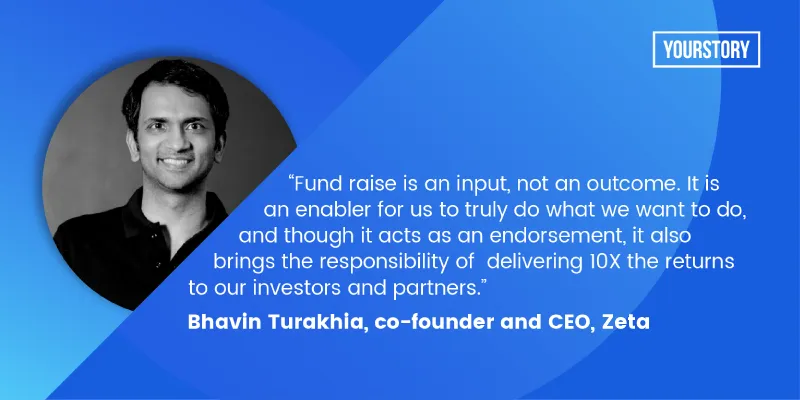Even after Zeta turns unicorn, founder Bhavin Turakhia believes it’s still day one for the banking tech startup
Bhavin Turakhia, founder of banking tech startup and new unicorn Zeta, outlines the company’s plans to target new markets and win over the top-tier global banks as customers.
Bhavin Turakhia founded his first startup before he turned 20. Since then, he has founded four companies, making his fortune in a series of multi-million-dollar-valued exits.
Now in a first for the serial entrepreneur, Bhavin has raised venture capital funding -- the largest-ever-single fundraise for a banking technology startup -- for Zeta, which he had co-founded with Ramki Gaddipati in 2015.
With a $250 million investment from SoftBank Vision Fund 2, Turakhia’s Zeta became the latest startup in India to turn unicorn in 2021, with a valuation of $1.45 billion. Admittedly, Zeta’s journey to unicorn status has been largely bootstrapped, until it raised funds about two years ago from Sodexo Benefits and Rewards.
But even as the banking startup hit a slew of new milestones with the SoftBank fundraise, for Bhavin and his team, “it’s still day one,” the entrepreneur tells YourStory, as he outlined his plans to expand Zeta’s operations in several key markets like North America, the UK, Germany, France, the Middle East, South East Asia, and Latin America.
“Fundraise is an input, not an outcome. It is an enabler for us to truly do what we want to do, and though it acts as an endorsement, it also brings the responsibility of delivering 10X the returns to our investors and partners,” says Bhavin.
The banking startup -- which already has a presence in markets like India, North America, the UK, Philippines, and Vietnam where it works with over 10 banks and 25 fintech firms -- is now looking to expand its reach to the top-tier 250 global banks, in more than 30-35 countries.

This means increasing staff strength in sales and marketing 5X to 200-250 people across the globe. All these plans are likely to be executed in the next 18 months, says Bhavin.
He adds, “Our ambition with Zeta is much bigger than anything that has been conceptualised till now. Though there is a long way to go, I believe it is still day one.”
Zeta’s clients include Sodexo, HDFC Bank, Kotak Mahindra Bank, Axis Bank, IndusInd Bank, Yes Bank, RBL Bank, and SBM Bank India, among others.
As a banking tech platform, Zeta’s Omni Stack offers modern credit and debit processing, core banking, and mobile experiences, among other services.
Commenting on the recent SoftBank deal, Munish Varma, Managing Partner, SoftBank Investment Advisers, says, “Banking software is a $300 billion industry globally. Most banks still employ technology that is significantly older than their customers, impacting user experience and engagement. Zeta’s modern Omni Stack will drive banking software upgrades catering to the digital consumer, and innovations in financial services globally.”

Zeta founders. (L-R) Ramki Gaddipati, co-founder and CTO with Bhavin Turakhia, co-founder and CEO
In its last round of funding in July 2019, the startup was valued at around $300 million.
The entrepreneurial journey
It has been over two decades since Bhavin began his journey as an entrepreneur by co-founding technology startup Directi in 1998.
Soon after that exit, Bhavin started three more tech startups – Radix, Flock, and Zeta. And although he now heads three technology startups, there is “no favourite child”, he adds in jest.
For the Mumbai-born entrepreneur, now based in London, there’s a common theme across all his startups.
“I have always started companies that are global in nature, and this has been our focus from a revenue generation point of view,” he says.
Though India remains a key market for Bhavin, the developed economies of North America and Europe have been his major revenue generator geographies.
Enabling banks with Zeta’s tech
According to Bhavin, “Zeta is enabling banks to leverage modern technology to improve their speed and agility, launch new products, reduce operational expenses, and provide modern user experience.”
Traditional banks and financial institutions are unable to carry out many of these functions because of their legacy infrastructure, he adds.
“Our open technology and API platform enables banks to bring in more partners, who can build meaningful new applications,” says Bhavin.
Zeta also creates tools for the end consumer, as Bhavin firmly believes that a technology-first approach creates an “outstanding customer experience”.

The omni technology stack of Zeta. (Credit: Zeta)
The company’s cloud-based platform, delivered through a Software as a Service (SaaS) model, is focused on three key aspects of the financial services industry: core banking, payments, and experience layer.
“We have always approached any concept from a product mindset,” he says.
The product stack of Zeta includes: Zeta Tachyon Credit, Debit and Prepaid processing with card controls and personal finance management capabilities; Zeta Tachyon Loans – a modern Buy-Now-Pay-Later and personal loan management platform; Zeta Tachyon Deposits – a modern core for DDA, checking accounts, savings accounts and deposits; and Zeta Tachyon Mobile – a ready-made, white-labeled, customisable mobile app for credit cards, savings accounts, prepaid, loans, Buy-Now-Pay-Later, personal finance management and more.
Advice to entrepreneurs
As a serial entrepreneur who started coding at a very young age, and with experience running multiple startups, Bhavin does have a ringside view of the ecosystem.

On newer entrepreneurs emerging out of India, Bhavin expresses awe at the quality of startups, founders, and product managers, especially those who have arrived on the scene in the last three years.
He says, “I feel deeply humbled when I see these new-age entrepreneurs who are young doing interesting things, though some may look crazy.”
Prod him on his advice for those entrepreneurs who may be bogged down by the pandemic, or aspiring ones who’re too hesitant to take the entrepreneurial leap, and he’s quick with an answer that’s reflective of his experience.
The way he looks at it, the pandemic has forced everybody to view things in a different way, and this could mean more opportunities for any aspiring entrepreneur.
He says, “Every adversity is an opportunity in disguise. The effect of Covid has been devastating but entrepreneurs need to identify the right pockets of opportunity in this adversity.”
Edited by Anju Narayanan and Tenzin Pema









